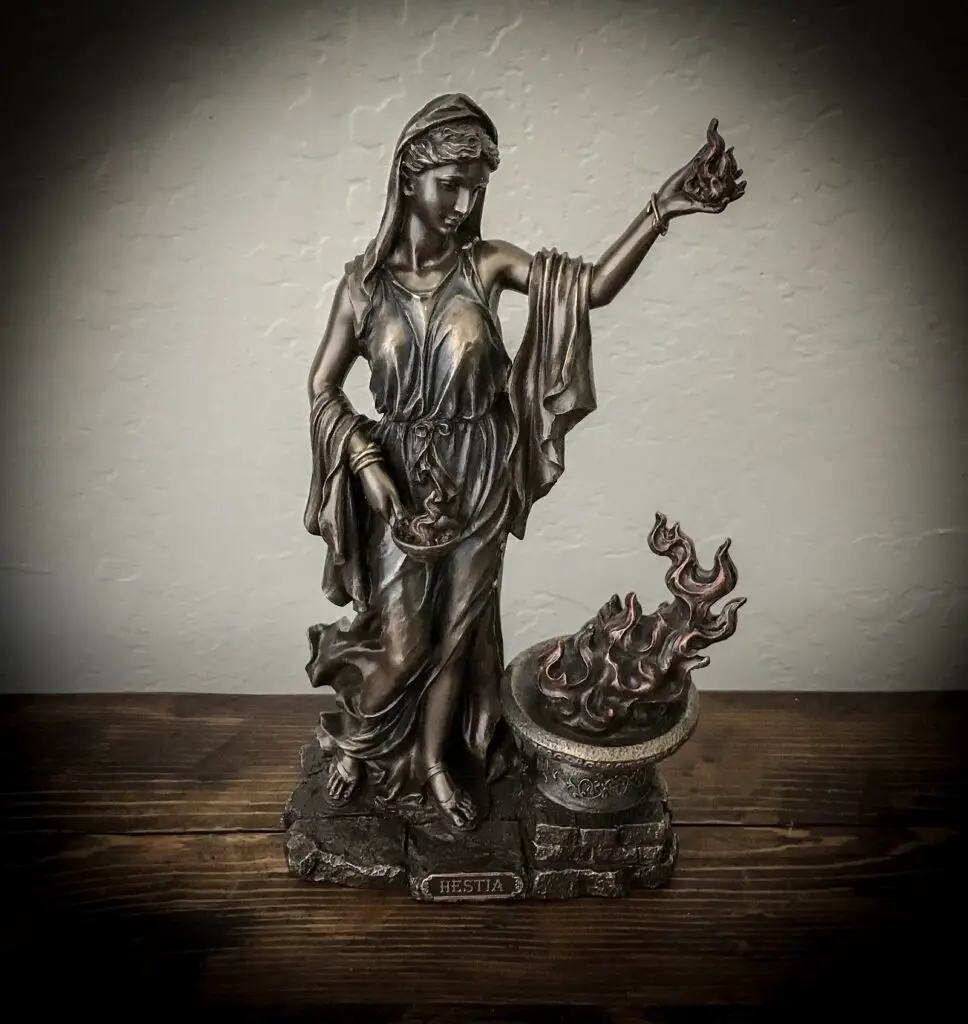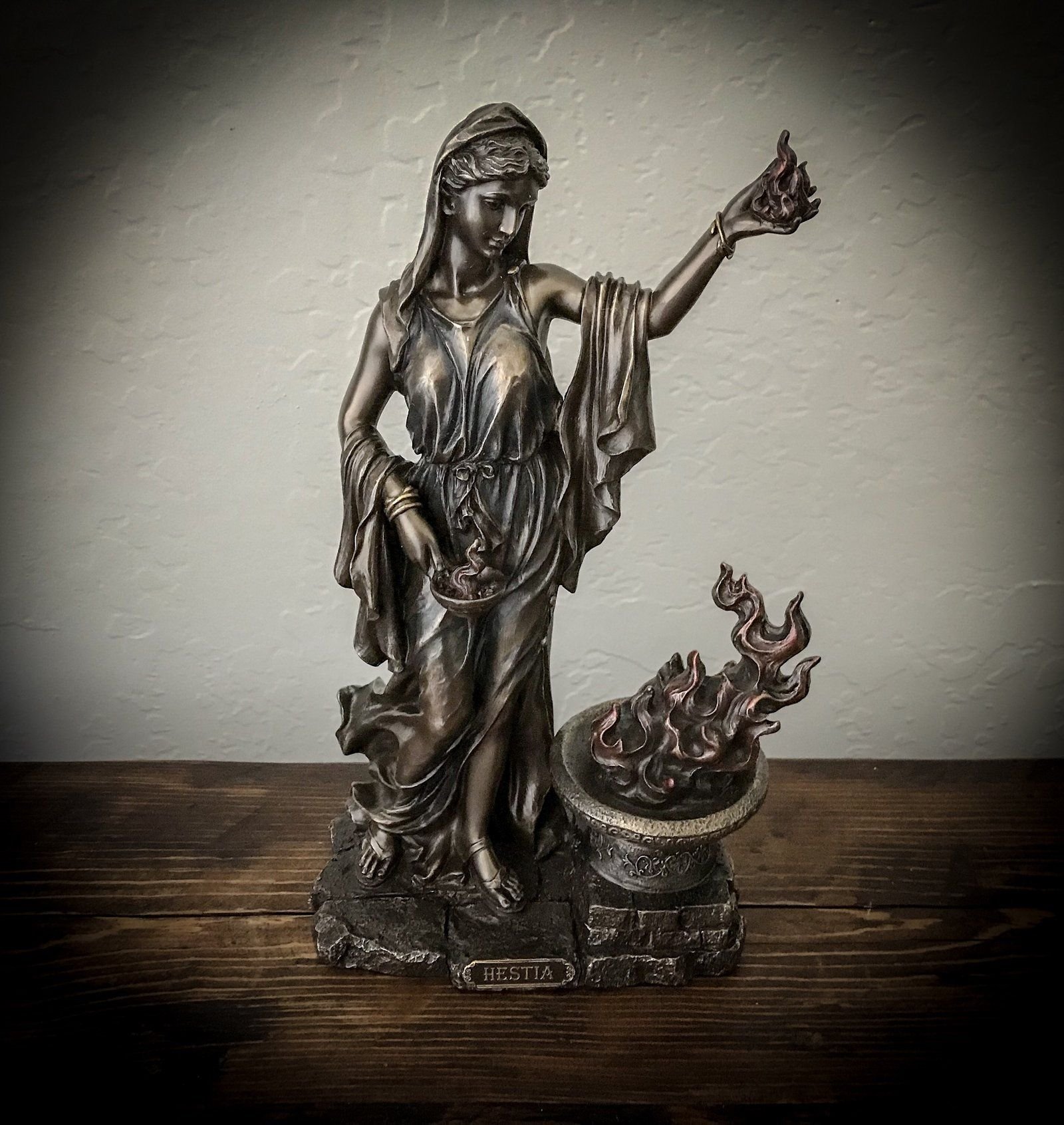
In the rich embroidery of Greek mythology, Hestia, the goddess of the hearth, frequently assumes a lower priority in relation to the more famous divinities like Zeus, Athena, and Aphrodite.
Yet, her presence and significance are profound.
In this article, we’ll shine a light on Hestia, sharing more than 10 intriguing facts about this often-overlooked goddess.
From her essential role in ancient Greek households to her timeless symbolism, you’ll discover the captivating world of Hestia.
10+ Hestia Goddess Facts
Fact #1: The eternal flame
One captivating facet worth noting is the concept of the Eternal Flame in ancient Greece.
It goes beyond being a mere source of illumination and warmth; it carries profound layers of symbolism and communal importance.
Imagine it not just as a physical flame, but as the very heart and soul of every Greek household.
It radiates as a beacon, not solely for providing light, but for instilling hope, offering protection, and fostering unity among the family members who gather around it.
This Eternal Flame, you see, possessed a power that extended beyond the physical realm.
It was believed to possess the capability to repel malevolent forces, offering not only the comforting embrace of physical warmth but also the solace of emotional belonging to those fortunate enough to bask in its radiant presence.
- Read also: Who is Theia? Unraveling the Enigmatic Powers and Enduring Legacy
- Read also: Who is Oshun Goddess? The Enchanting Goddess of Love and Harmony
Fact #2: Virgin Goddess
An intriguing facet of Hestia’s character lies in her status among the pantheon of Greek deities.
Unlike the majority of her divine peers, Hestia held a unique position as one of the few virgin goddesses.
Her choice to remain celibate set her apart, a deliberate decision to steer clear of romantic involvements and instead channel her undivided devotion towards the hearth and home.
This virginity wasn’t merely a happenstance; it was a deliberate choice that underscored her profound commitment to the sacred flame and her role as the guardian of domesticity and communal harmony.
In a world replete with passionate deities, Hestia’s unwavering dedication to her divine duty is a testament to her exceptional character.
Fact #3: Olympian status
Among the illustrious assembly of Olympian gods and goddesses who resided atop Mount Olympus, Hestia held a unique and revered status.
She was one of the twelve Olympians, a divine council of the most powerful and influential deities in Greek mythology.
Her presence in this esteemed group further emphasized the importance of the hearth, home, and communal bonds in Greek society.
Hestia’s position among the Olympians highlighted the essential role that the Eternal Flame played in the lives of the ancient Greeks, symbolizing the enduring importance of family and community in their culture.
Fact #4: Guardian of hospitality
Beyond her role as the guardian of the hearth, Hestia’s influence extended to a profound and sacred concept: hospitality.
In the tapestry of ancient Greece, the bond between host and guest held a place of unparalleled virtue, closely entwined with the realm Hestia presided over.
To violate this bond, sanctified by the goddess herself, was deemed a grave transgression.
Guests were not merely received with courtesy but with open arms, their safety and well-being safeguarded under the vigilant gaze of Hestia.
This veneration of hospitality, and the hallowed relationship between hosts and their guests, wove itself intricately into the fabric of Greek culture.
Fact #5: First and last
Hestia’s role within the Olympian pantheon transcended her position as the hearth’s guardian.
In the rich tapestry of Greek tradition, she held a truly exceptional distinction – that of being both the first and the last offspring of Kronos and Rhea, the Titans who reigned prior to the emergence of the Olympian gods.
This remarkable duality made Hestia not only the eldest but also the youngest among the six original Olympian siblings.
Her status as both the inaugural and ultimate member of this divine generation underscored her enduring presence and timeless significance within the intricate hierarchy of the gods.
Fact #6: Invisible beauty
Despite her pivotal role and esteemed status, Hestia was known for her quiet and modest demeanor.
In the grand tapestry of Greek mythology, she rarely took an active role in the conflicts and intrigues that often embroiled the gods and mortals.
This subdued presence led to her being affectionately nicknamed “The Invisible Goddess.”
However, her apparent passivity belied her immense influence in fostering the hearth’s warmth, family unity, and societal cohesion.
Hestia’s subtle, yet profoundly impactful, presence was a testament to the power of quiet strength and the often-overlooked virtues of simplicity and humility.
Fact #7: Roman equivalent
In the expansive realm of Roman mythology, Hestia finds her counterpart in the goddess Vesta.
Vesta, much like Hestia, held sway over the hearth and home in Roman culture.
The association between these two deities underscores the universality of the concepts they embodied, transcending cultural boundaries.
While their names differed, the essence of their roles as guardians of domesticity remained remarkably consistent, a testament to the enduring importance of the hearth in human civilization.
Fact #8: Symbol of the home
Hestia’s symbolism was elegantly simple yet profoundly meaningful.
She was represented by the hearth or fireplace, an image that underscored her deep connection to the very heart of the home.
Within this unassuming hearth, families gathered for warmth, sustenance, and companionship.
It was a place of communal unity.
In reverence to Hestia, offerings and prayers were customarily made before and after meals, recognizing her pivotal role in nourishing not only the body but also the bonds of kinship.
Fact #9: Divine Honors
In the religious tapestry of ancient Greece, Hestia occupied a position of unparalleled importance.
She was accorded the unique honor of receiving the first and last offerings during religious rituals and ceremonies.
This ritual practice was a poignant acknowledgment of her role as a deity who both bestowed blessings upon the commencement of events and presided over their closure.
It spoke to her significance in ensuring the sanctity and completeness of various religious observances, solidifying her status as a benevolent and indispensable presence in the divine pantheon.
Fact #10: Prominent temples
The profound influence of Hestia extended well beyond the realms of mythology; it was deeply etched into the very fabric of ancient Greece.
The Temple of Hestia, often referred to as the revered “Prytaneion,” occupied a central and cherished position in countless Greek cities.
Enshrined within its sacred confines lay the eternal flame, a symbol of unparalleled communal significance.
This sacred fire was more than a mere source of illumination and warmth; it embodied the very essence of Hestia’s presence, serving as the heart and soul of the community.
Fact #11: Hestia’s role in mythology
While Hestia may not be a leading character in the epic tales of Greek mythology, her role is undeniably pivotal.
She assumes the mantle of guardian over not only the hearths of mortal homes but also the divine abode atop Mount Olympus.
The flames of the Olympian hearth, tended to with unwavering diligence by Hestia, symbolize not only the safety but the perpetuity of the celestial dwelling of the gods.
Her dedication, though often unobtrusive, ensures that the divine fires never flicker or fade.
This serves as an enduring symbol of unity and vitality within the Olympian pantheon.
- Read also: Who Was Nyx in Greek Mythology
- Read also: Exploring the Timeless Power of Greek Fertility Goddesses
Conclusion
Hestia, the goddess of the hearth, may not have the fame of some other Greek deities, but her significance is undeniable.
From her role as the guardian of the home and hearth to her representation of hospitality and family unity, Hestia’s influence permeated the very fabric of ancient Greek society.
These 10+ Hestia goddess facts offer a glimpse into the world of this often-overlooked but deeply respected deity.
Her eternal flame, symbolic presence in our homes, and connection to the sacred bonds of hospitality continue to remind us of the enduring importance of warmth, unity, and tradition in our lives.
FAQs
While she may not have been as prominent in myths and legends as some other Olympian gods and goddesses, Hestia held a crucial role as the goddess of the hearth and home, making her highly respected.
Hestia earned this epithet due to her modest and unassuming nature. She rarely participated in conflicts or stories involving the other gods, preferring to focus on her duties.
The eternal flame in Hestia’s hearth represented the heart and center of the household. It was believed to bring warmth, protection, and unity to the family.
Yes, the Temple of Hestia, known as the “Prytaneion,” was a central structure in many Greek cities. It housed the eternal flame and served as a hub for important civic and religious events.



